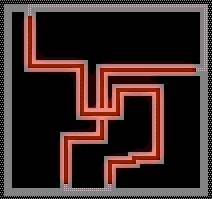Difference between revisions of "Element:NBLE"
(Remove element buttons, change specific element examples to instead say directly how hot it gets) |
m (Enter a long summary [b]) |
||
| Line 49: | Line 49: | ||
When NBLE is at 100 pressure and heated to 5,000 degrees, it will transform into PLSM and will also release 1 {{Material|NEUT}}, 1 {{Material|PHOT}} (colored red), and 1 particle of {{Material|CO2}}. It has a 1 in 25 chance of producing an [[Element:ELEC|electron]]. It will also generate 50 pressure and increase the surrounding temperature by around 250 degrees Celsius. | When NBLE is at 100 pressure and heated to 5,000 degrees, it will transform into PLSM and will also release 1 {{Material|NEUT}}, 1 {{Material|PHOT}} (colored red), and 1 particle of {{Material|CO2}}. It has a 1 in 25 chance of producing an [[Element:ELEC|electron]]. It will also generate 50 pressure and increase the surrounding temperature by around 250 degrees Celsius. | ||
| − | {{Languages}} | + | {{Languages|Element:NBLE}} |
[[Category:Elements]] | [[Category:Elements]] | ||
[[Category:Gases]] | [[Category:Gases]] | ||
Latest revision as of 04:04, 27 October 2023
 Diffuses and conductive. Ionizes into plasma when introduced to electricity. | |
| Properties | |
|---|---|
| Section | Gases |
| Spawn temperature | 24°C |
| Heat Conductivity | 42.4% |
| Relative weight | 1 |
| Gravity | 0 |
| Acid dissolve rate | 0.1% |
| Flammability | 0 |
| State | Gas |
| Misc properties | |
| Conducts electricity (SPRK) | |
| Source code | |
NBLE is a gaseous element that can undergo fusion. NBLE is the second stage in the nuclear fusion process (representing helium).
Creation
Can be created by PROT collisions and HYGN fusion.
Properties
NBLE is a conductive element. When sparked, it turns into PLSM and produces a significant amount of heat and a burst of pressure. The heat produced can be upwards of 3227C if sparked repeatedly. The produced PLSM eventually turns back into NBLE. NBLE also produces some pressure by itself, with an ambient pressure of around 3.5.
Fusion
When NBLE is at 100 pressure and heated to 5,000 degrees, it will transform into PLSM and will also release 1 NEUT, 1 PHOT (colored red), and 1 particle of CO2. It has a 1 in 25 chance of producing an electron. It will also generate 50 pressure and increase the surrounding temperature by around 250 degrees Celsius.
| Language: | English |
|---|